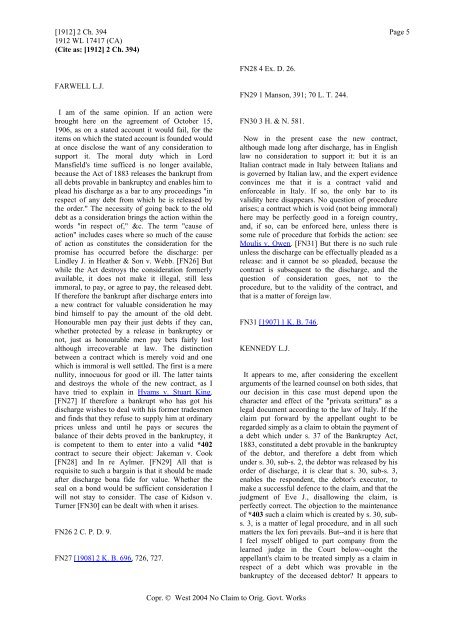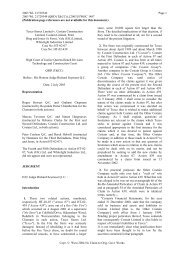In Re Bonacina Le Brasseur v Bonacina - Thomson Reuters
In Re Bonacina Le Brasseur v Bonacina - Thomson Reuters
In Re Bonacina Le Brasseur v Bonacina - Thomson Reuters
You also want an ePaper? Increase the reach of your titles
YUMPU automatically turns print PDFs into web optimized ePapers that Google loves.
[1912] 2 Ch. 394 Page 51912 WL 17417 (CA)(Cite as: [1912] 2 Ch. 394)FN28 4 Ex. D. 26.FARWELL L.J.I am of the same opinion. If an action werebrought here on the agreement of October 15,1906, as on a stated account it would fail, for theitems on which the stated account is founded wouldat once disclose the want of any consideration tosupport it. The moral duty which in LordMansfield's time sufficed is no longer available,because the Act of 1883 releases the bankrupt fromall debts provable in bankruptcy and enables him toplead his discharge as a bar to any proceedings "inrespect of any debt from which he is released bythe order." The necessity of going back to the olddebt as a consideration brings the action within thewords "in respect of," &c. The term "cause ofaction" includes cases where so much of the causeof action as constitutes the consideration for thepromise has occurred before the discharge: perLindley J. in Heather & Son v. Webb. [FN26] Butwhile the Act destroys the consideration formerlyavailable, it does not make it illegal, still lessimmoral, to pay, or agree to pay, the released debt.If therefore the bankrupt after discharge enters intoa new contract for valuable consideration he maybind himself to pay the amount of the old debt.Honourable men pay their just debts if they can,whether protected by a release in bankruptcy ornot, just as honourable men pay bets fairly lostalthough irrecoverable at law. The distinctionbetween a contract which is merely void and onewhich is immoral is well settled. The first is a merenullity, innocuous for good or ill. The latter taintsand destroys the whole of the new contract, as Ihave tried to explain in Hyams v. Stuart King.[FN27] If therefore a bankrupt who has got hisdischarge wishes to deal with his former tradesmenand finds that they refuse to supply him at ordinaryprices unless and until he pays or secures thebalance of their debts proved in the bankruptcy, itis competent to them to enter into a valid *402contract to secure their object: Jakeman v. Cook[FN28] and <strong>In</strong> re Aylmer. [FN29] All that isrequisite to such a bargain is that it should be madeafter discharge bona fide for value. Whether theseal on a bond would be sufficient consideration Iwill not stay to consider. The case of Kidson v.Turner [FN30] can be dealt with when it arises.FN26 2 C. P. D. 9.FN27 [1908] 2 K. B. 696, 726, 727.FN29 1 Manson, 391; 70 L. T. 244.FN30 3 H. & N. 581.Now in the present case the new contract,although made long after discharge, has in Englishlaw no consideration to support it: but it is anItalian contract made in Italy between Italians andis governed by Italian law, and the expert evidenceconvinces me that it is a contract valid andenforceable in Italy. If so, the only bar to itsvalidity here disappears. No question of procedurearises; a contract which is void (not being immoral)here may be perfectly good in a foreign country,and, if so, can be enforced here, unless there issome rule of procedure that forbids the action: seeMoulis v. Owen. [FN31] But there is no such ruleunless the discharge can be effectually pleaded as arelease: and it cannot be so pleaded, because thecontract is subsequent to the discharge, and thequestion of consideration goes, not to theprocedure, but to the validity of the contract, andthat is a matter of foreign law.FN31 [1907] 1 K. B. 746.KENNEDY L.J.It appears to me, after considering the excellentarguments of the learned counsel on both sides, thatour decision in this case must depend upon thecharacter and effect of the "privata scrittura" as alegal document according to the law of Italy. If theclaim put forward by the appellant ought to beregarded simply as a claim to obtain the payment ofa debt which under s. 37 of the Bankruptcy Act,1883, constituted a debt provable in the bankruptcyof the debtor, and therefore a debt from whichunder s. 30, sub-s. 2, the debtor was released by hisorder of discharge, it is clear that s. 30, sub-s. 3,enables the respondent, the debtor's executor, tomake a successful defence to the claim, and that thejudgment of Eve J., disallowing the claim, isperfectly correct. The objection to the maintenanceof *403 such a claim which is created by s. 30, subs.3, is a matter of legal procedure, and in all suchmatters the lex fori prevails. But--and it is here thatI feel myself obliged to part company from thelearned judge in the Court below--ought theappellant's claim to be treated simply as a claim inrespect of a debt which was provable in thebankruptcy of the deceased debtor? It appears toCopr. © West 2004 No Claim to Orig. Govt. Works
















